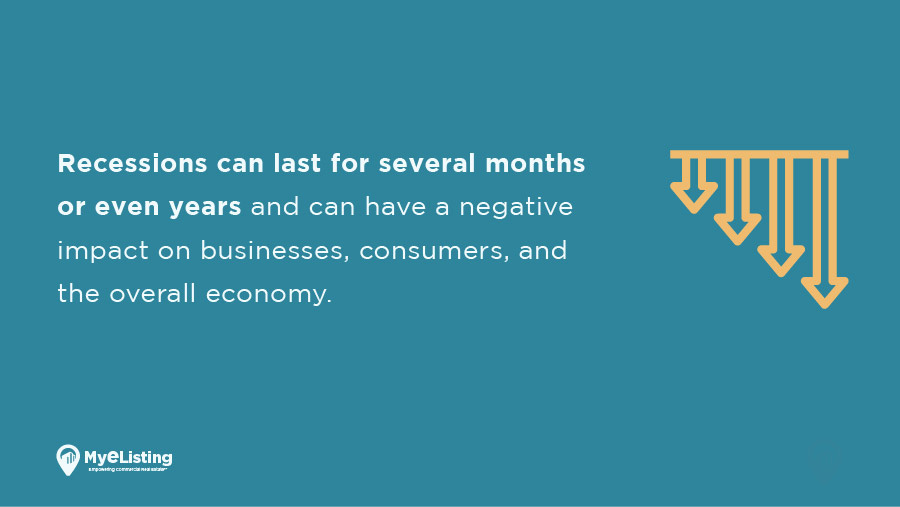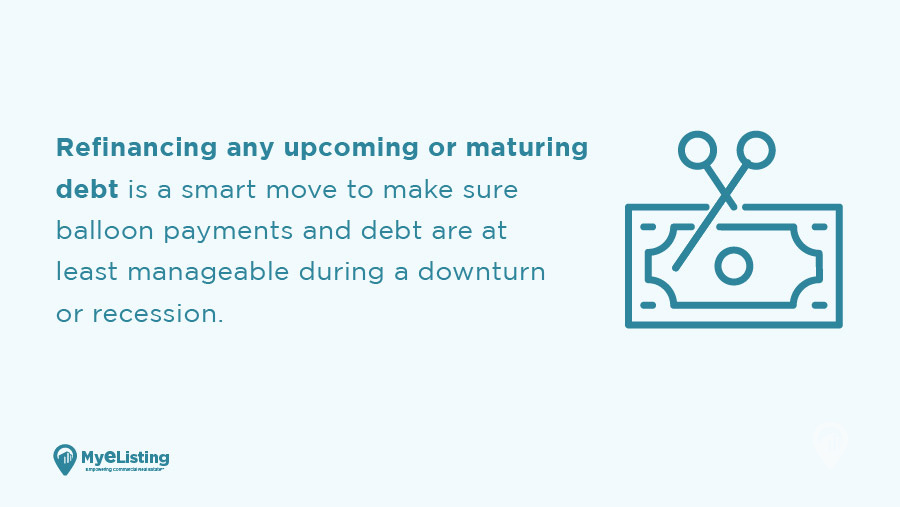Preparing for a Recession in Commercial Real Estate

Specializes in providing actionable insights into the commercial real estate space for investors, brokers, lessors, and lessees. He covers quarterly market data reports, investment strategies, how-to guides, and top-down perspectives on market movements.

The Great Recession of 2008 brought down several high-profile CRE companies and fund managers, but the market has rebounded strongly from its lows.
The next downturn will undoubtedly present new challenges to CRE investors and operators, but there are steps you can take now to help mitigate risk.
What Is an Economic Recession?

An economic recession is a period of time when the economy temporarily slows down due to two consecutive quarters of decreased gross domestic product (GDP) growth. This can be caused by many factors, such as a decrease in consumer spending, an increase in taxes, or a decrease in exports.
Recessions can last for several months or even years and can have a negative impact on businesses, consumers, and the overall economy. It’s typically characterized by a decrease in GDP, an increase in unemployment, and a decline in the stock market.
Impact of a Recession on CRE Investments
A recession can have a significant impact on commercial real estate. Multifamily real estate, for example, is considered an asset class that is particularly sensitive to economic downturns. Interest rates are also likely to rise during an economic recession, which could make it more difficult to refinance multifamily properties.
In addition, market conditions and property performance by type can vary significantly during a recession, making it difficult to predict how the commercial real estate market will perform.
Best Practices for Surviving a Recession With Commercial Real Estate
The commercial real estate industry is facing a major possible downturn due to the COVID-19 pandemic and a potential economic recession on the horizon in 2023. Many businesses are struggling to stay afloat, and office, retail, and hospitality properties are feeling the effects of shifting conditions.
While the recession may become dire, there are some best practices that landlords and property managers can follow to help weather the storm.
#1 – Right-Size Your CRE Portfolio
As the commercial real estate market fears recession, property owners are looking for ways to right-size their CRE portfolios. One way to do this is to sell off non-strategic properties and use the proceeds to purchase properties that better align with their long-term goals.
Another way to right-size your CRE portfolio is to develop a more efficient property management strategy that can help you save on operating costs.
#2 – Renegotiate Commercial Real Estate During a Recession
Office space availability and rental rates have increased in many markets across the country. As a result, some businesses are finding it necessary to renegotiate their commercial real estate leases.
While the real estate market is expected to continue improving over the next few years, some experts predict that another downturn could occur in 2023. As a result, now may be a good time for businesses to renegotiate their leases in order to get more favorable terms.
If you are considering renegotiating your lease, be sure to consult with a qualified real estate attorney or broker to ensure that you are getting the best possible terms.
#3 – Prepare Your CRE for a Recession With a Tenant Rep
A recession can have a big impact on your CRE portfolio. So it’s important to be prepared and have a tenant representation agent on your side. They can help you analyze your portfolio and make the best real estate moves to protect your investments.
Assuming a recession is coming, as many experts are predicting, now is the time to start preparing your CRE portfolio. The first step is to analyze your portfolio and identify any properties that may be vulnerable in a downturn. Once you have a list of these properties, you can begin to take steps to protect them.
For example, you may want to consider real estate moves that will make your properties more attractive to tenants or that will help reduce operating costs. Taking proactive measures now can help ensure that your CRE portfolio successfully weathers the next recession.
#4 – Keep Liquidity High
Liquidity is a term used to describe the availability of cash or other assets that can be easily converted into cash. Keeping decent liquidity doesn’t necessarily mean keeping large amounts of cash on hand.
Rather, it’s about having enough cash to help you stay afloat and cover any cashflow shortfalls if things get tough.
#5 – Refinance Upcoming or Maturing Debts

Refinancing any upcoming or maturing debt is a smart move to make sure balloon payments and debt are at least manageable during a downturn or recession.
Commercial real estate, depending on the property type, can be particularly vulnerable during an economic downturn, so refinancing any debt related to commercial property is a wise move.
#6 – Avoid Hyped Asset Classes
As investors seek to avoid over-heated asset classes, they turn to commercial real estate. Office space and industrial buildings with low interior finishes are in demand as consumers and retailers move to tertiary markets. Multifamily in tertiary markets is also an attractive option for investors.
#7 – Pay Attention to Interest Rates
As an investor, it’s important to pay attention to interest rates. They can have a big impact on commercial real estate and the economy as a whole. If rates rise, it can put pressure on the market and increase the possibility of a recession.
That’s why it’s important to prepare for a recession by diversifying your portfolio and having cash on hand to weather any potential storms.
#8 – Stay Informed

Staying informed about the real estate market and other economic conditions is important for anyone considering buying or selling property. Economic downturns can have a major impact on the value of real estate, so it’s crucial to be aware of market conditions.
While no one can predict where the economy will be five years from now, it is not unreasonable to expect a downturn in 2023 or 2024. With that said, it’s still important to stay informed about current conditions and to make plans for the future.
For example, you can prepare for a recession by researching property sales in your area as well as making sure that your CRE portfolio has cash on hand and liquidity in case things get tough. By preparing now, you can help ensure that your economic resources are at their best possible level later on down the line.
List & Browse Commercial Real Estate for Free on MyEListing.com!
You can list and browse commercial real estate for free right here on MyEListing.com.
Simply sign up for a free account and get unlimited access to accurate local market intelligence, customized property type alerts, comp software, and more.
Article Search
Share
All Article Categories








